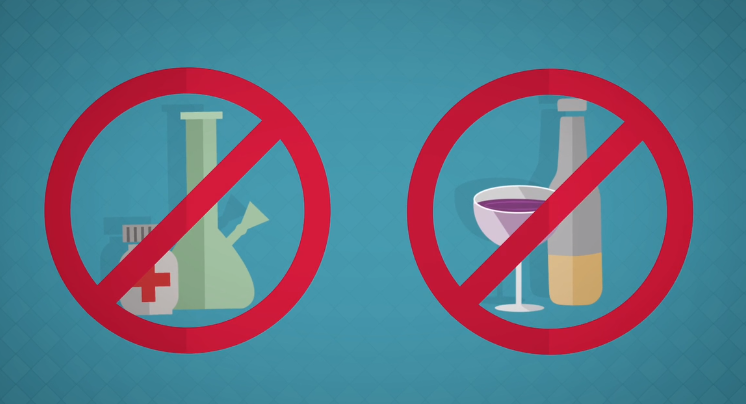For many students, going away to college will be the first time you are away from the familiarity of being with your family and friends. While this can be a very exciting time, moving your entire life to a new city, state, or even a new country can be a nerve-wracking experience. To cope with this new-found freedom, some students may turn to experimenting with drug use or binge drinking.
According to the National Institute on Drug Abuse, those who are enrolled in a full-time college program are twice as likely to abuse drugs and alcohol than those who don’t attend college.
For international students, there are many additional factors that may lead to drug and alcohol abuse. Due to cultural differences, you may not fully understand the extenuating circumstances that can lead to substance abuse and the consequences that could result. It is important to educate yourself on drug and alcohol awareness and what programs and resources are available to you while attending college in the United States.
Why do International Students Experiment with Drugs and Alcohol?
As an international student, this is most likely your first time away from home. You may feel nervous about being on your own in a new place, overwhelmed with new challenges and responsibilities, and a strong need to fit in with your community. These are all feelings that could cause you to turn towards experimenting with drugs and alcohol for the first time.
- Lifestyle Changes. For many international students, being away from home for the first time can be intimidating. Cultural differences, language barriers, and the distance between family and friends can be daunting. Dealing with culture shock, home sickness, and anxiety can lead to the use of alcohol and drugs.
- Stress. Managing the high-demands of coursework, extracurricular activities, finances and social obligations can be hard to juggle for any student. As an international student, you must also keep in mind your immigration status, which may cause additional stress. To maintain an active visa status, international students much attend and pass all classes and be enrolled in a full course load. Attending and passing all classes and being enrolled in a full course load is important to maintain an active visa status. This factor may lead to the abuse of stimulant-based drugs to help stay awake and study, or alcohol abuse to mask the feeling of stress.
- Peer pressure. Fitting in is a common influence that can lead students to experiment with drugs and alcohol in college. Typically, international students come to the United States not knowing anyone, so it is very likely that you may experiment with things you may not normally feel comfortable with in order to make friends and feel accepted.
What are the Consequences of Experimenting with Drugs and Alcohol?
Alcohol and drug use can impair one’s judgment leading to poor decision making and unsafe circumstances. Legal trouble, sexual assault, and accidental injuries are some of the common issues seen on college campuses that result from excessive drinking and drug use.
- In many countries around the world, the minimum drinking age is 18 or younger, so alcohol consumption may be a more normal part of your culture. In the United States, however, it is important to keep in mind that the minimum drinking age is 21. This means that consuming alcohol before turning 21 is illegal and could result in legal action. Drunk driving is also a serious criminal offense that could be a consequence of misusing alcohol and can result in high fines, jail time, and having your drivers license suspended. For international students, legal trouble could affect your visa status and could even result in your visa being revoked
- Being under the influence impairs your ability to give consent to sexual activity. Over half of the reported sexual assaults on college campuses involved alcohol or drug use. It is important to know your limits, watch your drink, and stay with your friends to protect yourself from a potentially dangerous situation.
- Each year, nearly 500,000 college students between the ages of 18 and 24 have been unintentionally injured due to alcohol and drugs use. Of these injuries, about 1,400 have resulted in death. Alcohol poisoning, falling from balconies or open windows, and motor vehicle crashes are among the most common ways that students are injured while under the influence.
Drug and Alcohol Awareness
Many colleges and universities in the United States have implemented programs on campus to educate their students about the harms of drug and alcohol abuse. These programs are typically included during orientation and attendance is required by all new students. During these programs, your school may address the health risks associated with misusing drugs and alcohol, as well as school standards and disciplinary actions that may be enforced.
Your school will also provide you with information for where you can go if you feel you may have a problem with substance dependency or abuse. On-campus counseling centers are usually a great place to start if you feel like you need help. Some schools may also have clubs that you can join that focus on recreational activities that don’t involve alcohol or drug consumption.
Besides the programs that are offered by colleges and universities, there are many additional resources available outside of your campus, where you may feel more comfortable seeking treatment.
- Alcoholics Anonymous and Narcotics Anonymous hold local weekly meetings where you can meet with other people who are also dealing with substance abuse
- Find alcohol, drug, or mental health treatment facilities and programs around the country
- Substance Abuse and Mental Health Services Administration National Hotline 1-800-662-HELP (4357)

